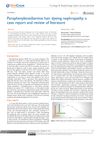 8 citations,
April 2015 in “British Journal of Dermatology”
8 citations,
April 2015 in “British Journal of Dermatology” White piedra, a rare fungal infection, was diagnosed in two women in a northern climate.
 7 citations,
April 2021 in “Dermatology and Therapy”
7 citations,
April 2021 in “Dermatology and Therapy” H-1 antihistamines may help with various skin conditions, but more research is needed to confirm their effectiveness.
 6 citations,
May 2017 in “InTech eBooks”
6 citations,
May 2017 in “InTech eBooks” Hair loss can cause serious mental health problems and treating it requires a team of experts.
 5 citations,
January 2022 in “Scientific reports”
5 citations,
January 2022 in “Scientific reports” The research identified two types of keratinocytes in chicken scales: one for hard scales and another for soft skin, with similarities to human skin differentiation.
 4 citations,
May 2018 in “Journal of Neuro-Ophthalmology”
4 citations,
May 2018 in “Journal of Neuro-Ophthalmology” New treatments for relapsing multiple sclerosis are more effective and convenient but have higher risks of serious side effects.
 4 citations,
January 2018 in “Urology & Nephrology Open Access Journal”
4 citations,
January 2018 in “Urology & Nephrology Open Access Journal” Hair dye chemicals can cause serious health problems, including kidney damage.
 4 citations,
July 2008 in “British journal of dermatology/British journal of dermatology, Supplement”
4 citations,
July 2008 in “British journal of dermatology/British journal of dermatology, Supplement” Poor response to topical immunotherapy in alopecia areata patients is linked to impaired cell responses.
 3 citations,
January 2024 in “Signal transduction and targeted therapy”
3 citations,
January 2024 in “Signal transduction and targeted therapy” Lymphatic vessels are essential for health and can be targeted to treat various diseases.
 3 citations,
January 2010 in “Elsevier eBooks”
3 citations,
January 2010 in “Elsevier eBooks” The document describes various skin conditions, their features, and treatments but lacks detailed study size information.
 2 citations,
December 2023 in “Journal of clinical immunology”
2 citations,
December 2023 in “Journal of clinical immunology” Ruxolitinib significantly improves multiple autoimmune conditions in APS-1 patients.
 2 citations,
March 2023 in “Frontiers in medicine”
2 citations,
March 2023 in “Frontiers in medicine” A 15-year-old boy's severe scalp condition improved significantly with adalimumab and baricitinib treatment.
 2 citations,
April 2021 in “Naukovì gorizonti”
2 citations,
April 2021 in “Naukovì gorizonti” Effective treatment significantly improves pododermatitis in dogs, reducing symptoms and extending remission.
 2 citations,
November 2019 in “Cancer reports”
2 citations,
November 2019 in “Cancer reports” The Wnt signaling pathway is not a major factor in the development of keratoacanthoma, a type of skin tumor.
 2 citations,
August 2019 in “Asian journal of pharmaceutical and clinical research”
2 citations,
August 2019 in “Asian journal of pharmaceutical and clinical research” Cinnamon bark extract may help prevent weight loss and hair loss in breast cancer patients during chemotherapy and is safe to use.
 2 citations,
January 2019 in “Elsevier eBooks”
2 citations,
January 2019 in “Elsevier eBooks” Biotin supplements are unnecessary for most people but may help with certain conditions like biotin deficiency, brittle nails, and some hair loss.
 1 citations,
October 2023 in “Romanian Journal of Morphology and Embryology”
1 citations,
October 2023 in “Romanian Journal of Morphology and Embryology” COVID-19 can cause various skin issues, but long-term skin problems are rare.
 1 citations,
September 2023 in “Acta dermato-venereologica”
1 citations,
September 2023 in “Acta dermato-venereologica” Certain genetic variants are linked to frontal fibrosing alopecia in Spanish patients.
 1 citations,
January 2023 in “International journal of all research education and scientific methods”
1 citations,
January 2023 in “International journal of all research education and scientific methods” Hair analysis is better than urine and blood for detecting past drug use.
 1 citations,
January 2022 in “The Egyptian Journal of Hospital Medicine ”
1 citations,
January 2022 in “The Egyptian Journal of Hospital Medicine ” Cryotherapy and steroid injections are similarly effective and safe for treating alopecia areata.
 1 citations,
February 2018 in “InTech eBooks”
1 citations,
February 2018 in “InTech eBooks” PCOS in lean women is a serious health condition with implications beyond fertility, affecting metabolism and increasing cardiovascular disease risk.
 1 citations,
September 2017 in “Journal of Investigative Dermatology”
1 citations,
September 2017 in “Journal of Investigative Dermatology” Blocking a specific enzyme can reduce the negative impact of stress hormones on hair growth cells.
 1 citations,
January 2017 in “Expert opinion on orphan drugs”
1 citations,
January 2017 in “Expert opinion on orphan drugs” Adalimumab is the most effective treatment for severe hidradenitis suppurativa, but more research is needed to improve treatment options.
 1 citations,
June 2010 in “Expert Review of Dermatology”
1 citations,
June 2010 in “Expert Review of Dermatology” Covers common skin issues in kids, their diagnosis, treatment, and need for specialist care.
 May 2024 in “Journal of Education, Health and Sport”
May 2024 in “Journal of Education, Health and Sport” Current treatments for folliculitis decalvans include antibiotics, isotretinoin, and potential new therapies like botulinum toxin A and PRP.
 April 2024 in “Research Square (Research Square)”
April 2024 in “Research Square (Research Square)” A 27-year-old with APS-1 showed improvement in symptoms after treatment.
 February 2024 in “Journal of applied pharmaceutical research”
February 2024 in “Journal of applied pharmaceutical research” Herbal hair oils with Coconut, Curry leaves, Amla, Fenugreek, and Onion promote hair growth and are safe.
 January 2024 in “International journal of homoeopathic sciences”
January 2024 in “International journal of homoeopathic sciences” Early intervention and patient education are crucial for managing alopecia areata.
 December 2023 in “Urogenital tract infection”
December 2023 in “Urogenital tract infection” Seminal bacteria can lower sperm quality in subfertile men.
 December 2023 in “Communications biology”
December 2023 in “Communications biology” Targeting the HEDGEHOG-GLI1 pathway could help treat keloids.
 November 2023 in “Linköping University medical dissertations”
November 2023 in “Linköping University medical dissertations” Keratinocytes and adipose-derived stem cells can effectively heal difficult skin wounds.






























